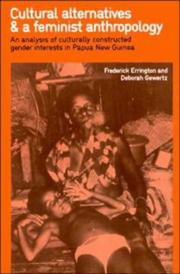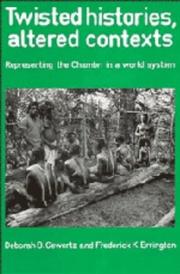| Listing 1 - 10 of 11 | << page >> |
Sort by
|
Book
ISBN: 0300028725 Year: 1983 Publisher: New Haven,London : Yale University Press,
Abstract | Keywords | Export | Availability | Bookmark
 Loading...
Loading...Choose an application
- Reference Manager
- EndNote
- RefWorks (Direct export to RefWorks)

ISBN: 0521334926 0521375916 9780521334921 9780521375917 Year: 1987 Publisher: Cambridge
Abstract | Keywords | Export | Availability | Bookmark
 Loading...
Loading...Choose an application
- Reference Manager
- EndNote
- RefWorks (Direct export to RefWorks)
Ethnology. Cultural anthropology --- Papua New Guinea --- Ethnology --- Sex role --- Chambri (Papua New Guinean people) --- Feminist anthropology --- Social life and customs --- Chambri (Papua New Guinea people) --- Chambri. --- Geschlechterrolle. --- Social life and customs. --- Chambri (Peuple de Papouasie-Nouvelle-Guinée) --- Rôle selon le sexe --- Moeurs et coutumes --- Chambri (Papua New Guinea people) - Social life and customs. --- Sex role - Papua New Guinea. --- Ethnology - Papua New Guinea - Chambri --- Sex role - Papua New Guinea - Chambri --- Chambri (Papua New Guinean people) - Social life and customs --- Sex role - Papua New Guinea --- Feminist anthropology - Papua New Guinea
Book
ISBN: 9781847883841 1847883842 Year: 2013 Publisher: London Bloomsbury Academic
Abstract | Keywords | Export | Availability | Bookmark
 Loading...
Loading...Choose an application
- Reference Manager
- EndNote
- RefWorks (Direct export to RefWorks)
The Handbook of Sociocultural Anthropology brings together international names from various branches and activities of all things socio-cultural, including Thomas Hylland Eriksen, Katherine Verdery, Veena Das and Andrés Barrera-González to name only 4 out of 43 contributors. This book warrants praise from the outset as the gargantuan task it represents does exactly what it sets out to do making it both a pleasure to peruse but also a vitally important and erudite addition to an anthropologist’s library. The enormity of the book means this review can only skim the surface but I will endeavour to present a holistic sense of the editors’ aim. Yet be aware that this review is focusing on those chapters that deal with the discipline of anthropology as a whole while other sections of the book deal with themes and more traditional concerns. The 29 chapters of this handbook span 5 sections each covering a particular theme or topic under the titles: Orientations; Elements; Issues; Regions; Context. Within each section there is considerable variation amongst the chapters. Throughout the book the authors are taking perspective on two main issues, the development of the discipline since the advent of post-modernism coupled with the changing institutional environment that affects where and how anthropology is practised. Crisis can lead to self-reflection and as Carrier points out in the introduction the notion that anthropology is a discipline in crisis is a cornerstone for its mode of reflexivity. This generally leads to ‘ought’ statements rather than ‘is’ statements with the resulting orientation in anthropology grasping-forward rather than taking-stock. This serves as the context for the book: Where is anthropology today?
Ethnologie --- Anthropologie --- #SBIB:39A1 --- Ethnology --- Cultural anthropology --- Ethnography --- Races of man --- Social anthropology --- Anthropology --- Human beings --- Antropologie: algemeen

ISBN: 0521395879 0521400120 1139166433 Year: 1991 Publisher: Cambridge : Cambridge University Press,
Abstract | Keywords | Export | Availability | Bookmark
 Loading...
Loading...Choose an application
- Reference Manager
- EndNote
- RefWorks (Direct export to RefWorks)
Deborah Gewertz and Frederick Errington have worked as anthropologists in Papua New Guinea for nearly two decades. In this, their second joint study of the Chambri, they consider the way those in a small-scale society, peripheral to the major centres of influence, struggle to sustain some degree of autonomy. They describe the Chambri caught up in world processes of social and cultural change, and attempt to create a 'collective biography' which conveys the intelligibility and significance of the twentieth-century experience of these Papua New Guineans whom they have come to know well. This biography consists of interlocking stories, twisted histories, commentaries and contexts about Chambri who are negotiating their objectives while entangled in systemic change and confronting Western representations of modernization and development.
Acculturation --- Chambri (Papua New Guinean people) --- Economic conditions. --- Ethnic identity. --- Social conditions. --- Chambri (Peuple de Papouasie-Nouvelle-Guinée) --- Chambri (Peuple de Papouasie-Nouvelle-Guinée) --- Social life and customs. --- Moeurs et coutumes --- Identité ethnique --- Conditions économiques --- Social Sciences --- Anthropology --- Chambri (Papua New Guinea people) --- Tshamberi (Papua New Guinean people) --- Ethnology --- Papuans --- Culture contact (Acculturation) --- Development education --- Civilization --- Culture --- Assimilation (Sociology) --- Cultural fusion
Book
ISBN: 9781474283465 9781847883841 Year: 2016 Publisher: London Bloomsbury Academic, an imprint of Bloomsbury Publishing Plc
Abstract | Keywords | Export | Availability | Bookmark
 Loading...
Loading...Choose an application
- Reference Manager
- EndNote
- RefWorks (Direct export to RefWorks)
Book
ISBN: 1282359827 9786612359828 0520945972 9780520945975 9781282359826 9780520260924 0520260929 9780520260931 0520260937 661235982X Year: 2010 Publisher: Berkeley, CA University of California Press
Abstract | Keywords | Export | Availability | Bookmark
 Loading...
Loading...Choose an application
- Reference Manager
- EndNote
- RefWorks (Direct export to RefWorks)
Cheap Meat follows the controversial trade in inexpensive fatty cuts of lamb or mutton, called "flaps," from the farms of New Zealand and Australia to their primary markets in the Pacific islands of Papua New Guinea, Tonga, and Fiji. Deborah Gewertz and Frederick Errington address the evolution of the meat trade itself along with the changing practices of exchange in Papua New Guinea. They show that flaps-which are taken from the animals' bellies and are often 50 percent fat-are not mere market transactions but evidence of the social nature of nutrition policies, illustrating and reinforcing Pacific Islanders' presumed second-class status relative to the white populations of Australia and New Zealand.
Nutritional anthropology --- Lamb meat industry --- Mutton industry --- Animal gut industries --- Food habits --- Eating --- Food customs --- Foodways --- Human beings --- Habit --- Manners and customs --- Diet --- Nutrition --- Oral habits --- Gut industries --- Meat industry and trade --- Anthropology --- Pacific Islands --- Pacific Ocean Islands --- Foreign economic relations --- anthropology. --- australia. --- belly meat. --- controversial. --- cuts of meat. --- discount meat. --- ethnic differences. --- ethnographers. --- farms and farmers. --- fatty cuts. --- fatty meat. --- fiji. --- flap food. --- food politics. --- historical. --- human rights. --- inexpensive meat. --- lamb. --- meat farming. --- meat market. --- meat trade. --- mutton. --- new zealand. --- nonfiction. --- nutrition policies. --- pacific islanders. --- pacific islands. --- papua new guinea. --- second class status. --- social issues. --- social nutrition. --- social science. --- tonga. --- trade policies.

ISBN: 110711733X 1280420634 0511175779 0511016409 0511156375 0511329237 0511606125 0511048181 9780511016400 9780511175770 9780511606120 9786610420636 6610420637 052165212X 9780521652124 9780511156373 9780511048180 0521655676 9780521655675 9781280420634 9780511329234 Year: 1999 Publisher: Cambridge, U.K. New York Cambridge University Press
Abstract | Keywords | Export | Availability | Bookmark
 Loading...
Loading...Choose an application
- Reference Manager
- EndNote
- RefWorks (Direct export to RefWorks)
This accessible 1999 study of social class in contemporary Papua New Guinea deals with the new elite, its culture and its institutions, and its relationship to the broader society. The Papua New Guinea described here is not a place of exotic tribesmen, but a modernising society, shaped by global forces, and increasingly divided on class lines. The authors describes the life-style of the elite Wewak, a typical commercial centre, their golf clubs and Rotary gatherings, and bring home the ways in which differences of status are created, experienced and justified. In a country with a long tradition of egalitarianism, it has become at once possible and plausible for relatively affluent 'nationals' to present themselves in a wide range of contexts as fundamentally superior to 'bushy' people, to blame the poor for their misfortunes, and to turn their backs on their less successful relatives.
Social classes --- Class distinction --- Classes, Social --- Rank --- Caste --- Estates (Social orders) --- Social status --- Class consciousness --- Classism --- Social stratification --- Wewak (Papua New Guinea) --- Social conditions. --- Social Sciences --- Anthropology
Book
ISBN: 1000181499 1003086985 1000184676 147252005X 9781472520050 9781847883841 9781000181494 9781003086987 9781000184679 9781000188127 1000188124 Year: 2020 Publisher: London : Routledge,
Abstract | Keywords | Export | Availability | Bookmark
 Loading...
Loading...Choose an application
- Reference Manager
- EndNote
- RefWorks (Direct export to RefWorks)
he Handbook of Sociocultural Anthropology presents a state of the art overview of the subject - its methodologies, current debates, history and future. It will provide the ultimate source of authoritative, critical descriptions of all the key aspects of the discipline as well as a consideration of the general state of the discipline at a time when there is notable uncertainty about its foundations, composition and direction. Divided into five core sections, the Handbook: examines the changing theoretical and analytical orientations that have led to new ways of carrying out research; presents an analysis of the traditional historical core and how the discipline has changed since 1980; considers the ethnographic regions where work has had the greatest impact on anthropology as a whole; outlines the people and institutions that are the context in which the discipline operates, covering topics from research funding to professional ethics.Bringing together leading international scholars, the Handbook provides a guide to the latest research in social and cultural anthropology. Presenting a systematic overview - and offering a wide range of examples, insights and analysis - it will be an invaluable resource for researchers and students in anthropology as well as cultural and social geography, cultural studies and sociology.
Ethnology --- Cultural anthropology --- Ethnography --- Races of man --- Social anthropology --- Anthropology --- Human beings
Book
ISBN: 0813324548 Year: 1995 Publisher: Boulder (Colo.) : Westview press,
Abstract | Keywords | Export | Availability | Bookmark
 Loading...
Loading...Choose an application
- Reference Manager
- EndNote
- RefWorks (Direct export to RefWorks)
Book
ISBN: 9781139166430 9780521400121 9780521395878 Year: 1991 Publisher: Cambridge Cambridge University Press
Abstract | Keywords | Export | Availability | Bookmark
 Loading...
Loading...Choose an application
- Reference Manager
- EndNote
- RefWorks (Direct export to RefWorks)
| Listing 1 - 10 of 11 | << page >> |
Sort by
|

 Search
Search Feedback
Feedback About UniCat
About UniCat  Help
Help News
News